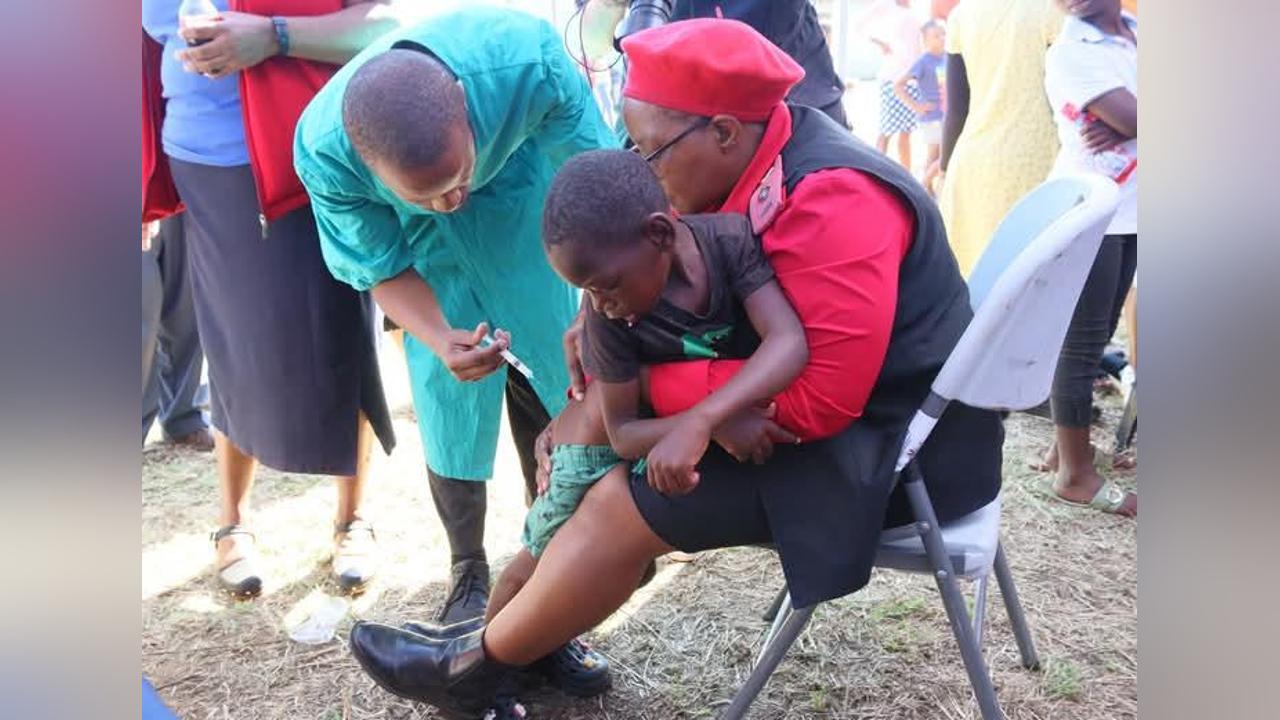Africa-Press – Eswatini. When Nomsa Simelane’s neighbour’s baby fell gravely ill from measles, she saw fear turn into resolve.
For weeks, she had delayed vaccinating her own child after hearing whispers of a chilling link between autism and vaccines.
But that night, holding her healthy son in her arms after finally getting him vaccinated, she understood: misinformation can be deadly.
“I realised I was gambling with my child’s life based on hearsay,” Simelane recalls.
During African Vaccination Week, this personal fear—and the powerful decisions that stem from it—took centre stage as the World Health Organisation (WHO) and Eswatini’s Ministry of Health issued a unified message: there is no link between vaccines and autism.
This assertion is not based on belief but on decades of scientific evidence. “The idea that vaccines cause autism has been thoroughly investigated and disproven,” said Dr. Emmanuel Olayinka, WHO’s country representative. “Yet the rumour persists—and it puts lives at risk.”
The origin of the myth traces back to a now-discredited study published in 1998, which suggested a link between the MMR (measles, mumps, and rubella) vaccine and autism.
The paper was later retracted, the lead author was stripped of his medical license, and extensive research has since found no causal relationship between any vaccine and autism.
Still, the damage was done.
In Eswatini, vaccine hesitancy surged during the Covid-19 pandemic, giving rise to new fears and old misconceptions.
Some emaSwati began associating autism, a complex neurological condition, with side effects of the Covid-19 vaccine or even routine childhood immunisations.
“There’s a lot we still don’t understand about autism,” said Dr. Albarto Mpensa, a child health specialist. “But one thing is clear: vaccines do not cause it.”
Autism, which affects social interaction and communication, is now more commonly diagnosed, not because of any vaccine link, but because awareness and diagnostic tools have improved. “
What people see as a sudden increase is largely better recognition,” Mpensa added.
For health workers like Sister Zanele Mamba at Mbabane Government Hospital, confronting these myths is part of daily life. “Some parents walk in afraid.
Fighting Back Against Fear- Eswatini and WHO Confront Autism-Vaccine Misinformation
They’ve heard rumours on WhatsApp or Facebook. But when we sit them down and explain, most of them listen. They want what’s best for their children.”
And the stakes could not be higher.
“Measles, polio, tetanus—these are diseases we’ve fought hard to control. But if immunisation rates fall, they’ll come back. And they’ll take children with them,” warned Dr. Sandziso Dlamini, Programme Leader in the Ministry of Health.
Eswatini has already made remarkable progress. According to the Expanded Programme on Immunisation (EPI), more than 80% of children under five are fully vaccinated.
This has led to a 60% drop in measles cases since 2010 and over a decade without a confirmed case of polio.
But even with such success, one false narrative on social media can undo years of work.
The Ministry of Health is not taking chances. Teams have been dispatched across the country to host forums, visit schools, and speak directly with caregivers in rural and peri-urban areas.
Leaflets outline vaccine schedules and debunk common myths, while radio stations broadcast interviews with medical experts.
“We want to ensure that no child is left behind because of misinformation,” said Phindile Nxumalo, EPI Coordinator. “Vaccines don’t just protect individuals—they protect communities.”
Technology has also played a dual role in the vaccine conversation. While it spreads misinformation, it also enables faster, targeted responses.
The Ministry plans to use WhatsApp, Facebook, and local influencers to share accurate health messages during and after African Vaccination Week.
Vaccine resistance, though not widespread in Eswatini, is loud. But trust—earned through listening and honest engagement-is—is proving louder.
Mxolisi Nhlabatsi, a father of twin girls, said he was never in doubt. We live in close quarters. If one child gets sick, it spreads. I wasn’t about to risk it. My daughters got their shots, and they’re thriving.”
Stories like his give health officials hope—and urgency. As WHO continues to support Eswatini’s efforts with medical supplies and technical expertise, Dr. Olayinka underscores the core message:
“Vaccines are among the greatest achievements in modern medicine. Protecting children should never be a question of fear—it should be a promise we keep.”
As African Vaccination Week draws to a close, the Ministry’s work continues. For every child protected and every parent reassured, the battle against misinformation inches forward.
Because in the end, it’s not just about shots in the air. It’s about trust in science, in medicine, and in the simple but profound act of safeguarding a child’s future.
For More News And Analysis About Eswatini Follow Africa-Press







